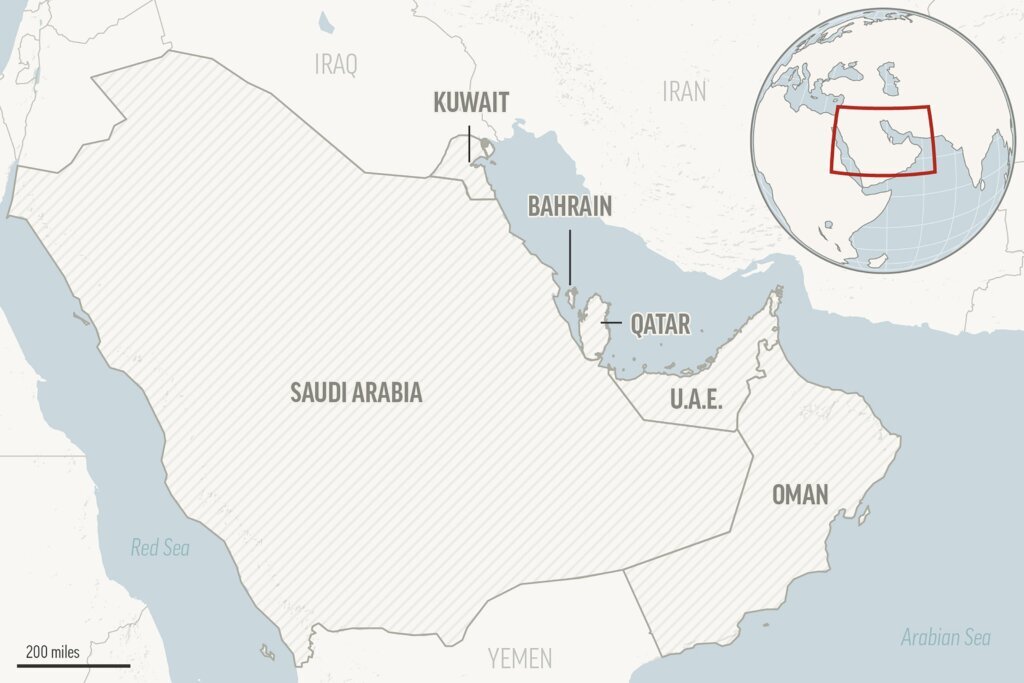In attack that shocks quiet Oman, gunmen kill 6 and wound dozens more at a Shiite mosque

DUBAI, United Arab Emirates (AP) — Several gunmen burst into a Shiite mosque in the Gulf Arab state of Oman and opened fire, killing six people and wounding nearly 30 more, authorities said Tuesday, stunning the peaceful sultanate and making it the deadliest attack there in recent memory.
The Islamic State extremist group, through an affiliated news agency, claimed responsibility for the attack in the capital, Muscat, without providing evidence. It marked the first time that the Sunni Muslim extremist group has asserted responsibility for an attack in Oman.
That the Islamic State, which considers Shiites to be heretics, targeted Shiite worshippers on the eve of their holy day was nothing new — the group earlier this year claimed responsibility for an attack in Shiite-majority Iran that killed 84 people.
Most shocking, analysts said, was that the attack happened in Oman, a quiet country on the southeastern edge of the Arabian peninsula with well-trained security forces, a state policy of non-intervention and a majority population of Muslims that are neither Sunni nor Shiite.
“It illustrates that ISIS thinks outside of the box and tries to do things that most people think wouldn’t be possible, taking advantage of small failures within security architectures of different countries,” said Aaron Y. Zelin, a senior fellow at the Washington Institute for Near East Policy.
There is no known branch of the Islamic State in Oman, a country that tends to stay out of the sectarian disputes roiling the wider region. But Islamic extremists, including a local branch of al-Qaida with a history of cross-border attacks, have exploited the chaos of that country’s war for much of the past decade.
The Royal Oman Police said the shooting killed five worshippers in the mosque in Muscat’s Wadi Kabir neighborhood and one police officer. Omani authorities did not specify the number of gunmen or provide their nationalities but said security forces had killed three attackers.
At least 28 people were wounded in the shooting, Omani police added, among them officers and medics. The mosque was packed with worshippers holding special prayers on the eve of the Shiite mourning festival of Ashoura, which marks the 7th century martyrdom of the Prophet Mohammed’s grandson, Hussein, at Karbala in modern-day Iraq.
Pakistan identified four of the dead as its citizens. Nearly 2 million migrants, mostly from South Asia, help power Oman’s economy by filling low-skilled jobs in construction and other fields.
Analysts described the rare shooting as the latest example that the Islamic State, after losing its territory in Iraq and Syria some five years ago, is returning to international acts of militancy.
“It makes them more resilient in some ways,” Zelin said of the strategy shift, citing the deadly attack in March on a Moscow concert hall and other bombings across Afghanistan and Pakistan. “It’s part of their reorganization from being a group with most of its actions in Iraq and Syria to using their resources in a global network.”
The U.S. Embassy in Muscat issued a security alert, warning citizens to “stay vigilant.”
Like other sheikhdoms in the Persian Gulf, Oman retains tight controls on traditional media and its state news agency on Tuesday praised authorities’ success in containing the chaos but offered scant information about the state of investigations. In an interview with the Times of Oman, an English-language daily, an unidentified Pakistani witness reported that the shooting lasted for an hour and a half.
Statements of condolence and outrage came from around the region, where Oman plays a sensitive role.
The sultanate maintains friendly relations both with Saudi Arabia, the heartland of traditionalist Sunni Islam, and its regional rival, the Shiite power Iran.
Oman is unique in the world as the only country with a majority population of Ibadi Muslims — a more liberal offshoot of Islam predating the Sunni-Shiite split.
Many of Oman’s migrant workers hail from Pakistan, where the Islamic State’s regional affiliate, Islamic State Khorasan, has claimed a series of deadly suicide bombings and other attacks targeting Shiite mosques in recent years.
“Pakistan stands in solidarity with the Sultanate of Oman and offers full assistance in the investigation,” Pakistani Prime Minister Shehbaz Sharif wrote on the social media platform X, saying he was “deeply saddened” by the shooting.
